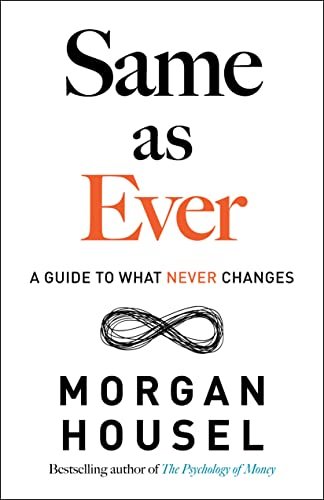Book Review: Same as Ever: A Guide to What Never Changes by Morgan Housel
There’s something undeniably comforting about the idea that amidst the whirlwind of life, there are timeless truths we can lean on. This thought was precisely what drew me to Same as Ever: A Guide to What Never Changes by Morgan Housel. With his previous work, The Psychology of Money, firmly making its mark on my bookshelf, I was curious to see what insights Housel would share about the unchanging patterns of our human experience. And let me tell you—prepare for some serious lightbulb moments.
As I dove into the book, it felt as if I was having an intimate chat over coffee with that wise friend who’s seen it all. Housel expertly guides us through a historical garden, his focus set on the sturdy perennials of human nature and societal behavior that endure through the ages. He doesn’t attempt to predict the future. Instead, he unearths lessons from our past, reminding us, "The more things change, the more they stay the same." This perspective reframes how we view current events, offering solace in our modern chaos.
One of the standout themes in this book is risk. Housel posits that the most significant dangers often come from the unseen—the "unknown unknowns." Using the Titanic as a case study, he draws parallels to contemporary crises, like the 2008 financial meltdown. This realization hit home for me, illustrating how we often focus on perceived security rather than preparing for the unexpected.
Another powerful chapter discusses progress, likening it to a drunken, stumbling journey rather than a straight ascent. At a time when the world feels drenched in negativity and uncertainty, this notion is refreshing and strangely reassuring. It’s a reminder that setbacks are simply part of the growth process.
Housel’s writing is where the magic truly unfolds. His storytelling ability transforms complex ideas into relatable anecdotes. The chess story, illustrating exponential growth, sticks with you, demonstrating how rapidly seemingly small actions can accumulate into something monumental. And his dry humor? Gold. Housel perfectly quips, "Experience is the best teacher, but it charges very expensive tuition," making profound insights more digestible.
Of course, the book isn’t without room for improvement. At times, some ideas felt a bit repetitive, and a more global perspective might enrich the narrative, given its primarily Western-centric examples. Additionally, while the insights are deeply valuable, a few concrete action steps would have laid a roadmap for applying these truths in a practical manner.
Ultimately, Same as Ever serves as a lens to rethink our decisions and anxieties. Whether you’re grappling with career choices, personal relationships, or the constant inundation of news, this book provides a stable foundation anchored in historical truths.
Who is this book for? If you relished Housel’s The Psychology of Money, or find yourself fascinated by historical patterns and human behavior, you’ll uncover a wealth of wisdom here. Reading it left me pondering new perspectives and even murmuring, "Huh, I never thought of it that way before."
In a world that feels perpetually chaotic, Same as Ever makes for a comforting companion, reminding us that, despite the changes, some truths will always remain.
[ad_2]
Discover more about Same as Ever: A Guide to What Never Changes on GoodReads >>







